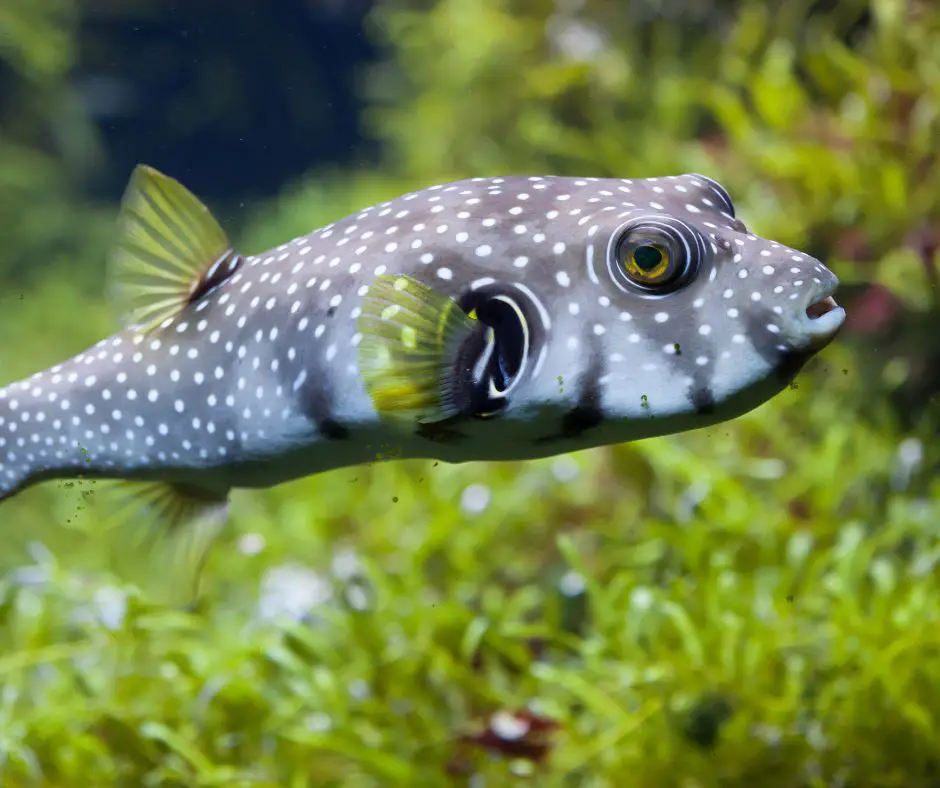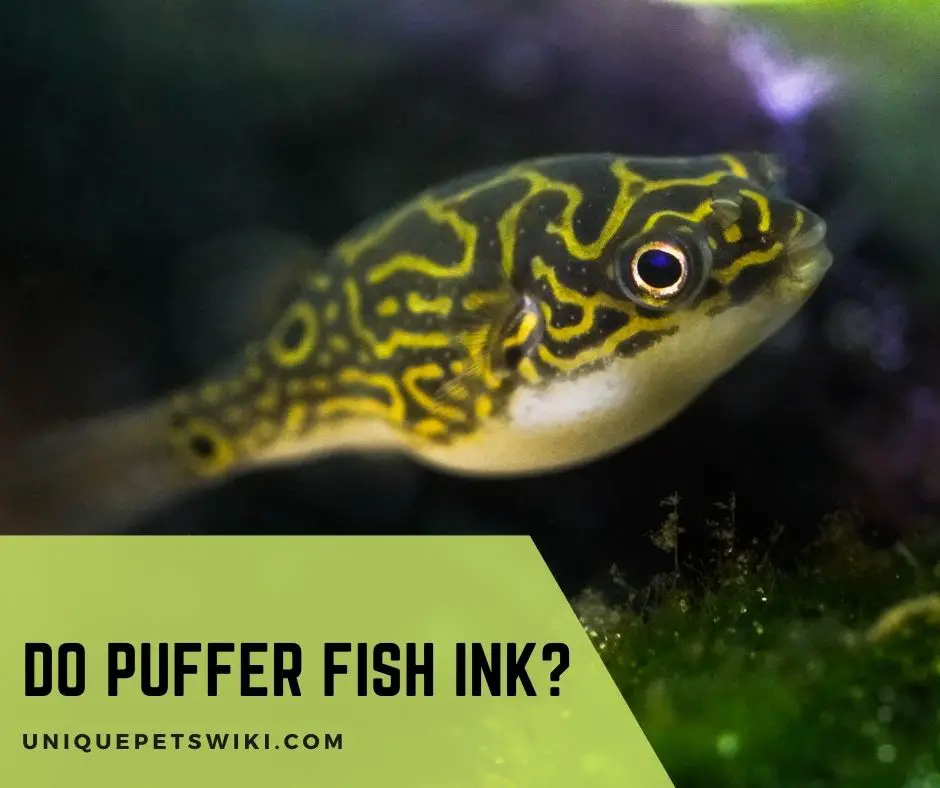It is quite natural for puffer fish owners to wonder ‘do puffer fish ink?’
After all; inking is a defense mechanism seen in several aquatic species. Also, the ink sprayed contains tetrodotoxin which pufferfish are known to contain in their organs. So, it is but natural for people to think that even puffer fish can ink.
Is it true, though? Do puffer fish ink? Read on – the answer might surprise you!
Contents
Do Puffer Fish Ink?
Pufferfish do not ink. Inking is a defense mechanism used by cephalopods like cuttlefishes, squids, and octopuses.
These creatures use an inky spray to frighten their enemies off. The ink not only stuns the predators; it also helps the animal hide in its cloud.
Pufferfish do not ink for two reasons. Firstly, they are not cephalopods – they lack the mechanism needed to produce ink.
Secondly, they use another unique defense mechanism. They puff up by swallowing water and expand to nearly three times their normal size when they feel threatened.
The puffing-up action helps them in two ways: it makes the pufferfish look bigger and more intimidating to their enemies. It also renders them difficult to swallow for their predators.
Resultantly, pufferfish do not need to spray ink at their enemies as squids and octopuses do.

Which Animals Have Ink?
Several creatures in the animal kingdom are equipped with ink sacs to spray ink or other foul-smelling liquids as a part of their defense mechanism. These include cephalopods, mollusks, and even some terrestrial animals.
Cephalopods
Cephalopods like cuttlefish, squid, and octopus spray ink from an ink sac located near their anus. The ink contains mucus, proteins, amino acids, and pigment. Spraying ink helps the animal in multiple ways:
- It creates a dark cloudy spray for the animal to hide and escape.
- The spray also develops bubbles that look like “small decoy fish”. The predator confuses the bubbles for fish and goes after them while the real animal escapes.
- The ink also contains L-dopa – a precursor to dopamine which temporarily paralyzes the predator.
- It also masks the animal’s scent to confuse predators that hunt using their sense of smell.
Sea hares
Mollusks like sea hares (Aplysia) also spray ink. Their ink is purple in color and contains a milky chemical called opaline.
Zorrillas/Striped Polecats
Striped polecats look like skunks but aren’t. They spray a pungent fluid from their anal glands when threatened.
Skunks
Skunks are especially notorious for their foul-smelling sprays. The spray comes out of the anal glands and its stench is quite difficult to get rid of. Moreover, skunk spray can temporarily blind the predator which helps the skunk escape.
Millipedes
They may look tiny but a millipede‘s secretions are potent. The spray contains hydrochloric acid that is known to cause intense itching and burning on the skin.
Bombardier beetles
Bombardier beetles have firing ducts on their backside through which they shoot out noxious-smelling gas at a temperature of 212 F. The gas also comes out with a loud pop that frightens the predators away.
How Does a Puffer Fish Defend Itself
The puffer fish may not be able to spray ink but it has a rather interesting and unique way of defending itself. When threatened, it swallows water and puffs up to almost three times its non-puffed size.
This is usually enough to scare away predators that do not already know that the puffer fish is poisonous.
Puffers also use their sharp spiky fins to scare predators away. They can even swim fast by using bursts of speed to outswim their slower enemies.
Some species of puffer fish also contain a deadly neurotoxin (tetrodotoxin) in their organs – namely the liver, ovaries, and stomach. This makes them dangerous to eat. The toxin is potent and can kill within hours.
Check out our guide on how do puffer fish protect themselves to learn more about the pufferfish’s unique defense mechanism.
FAQs
Do puffer fish inject poison?
Pufferfish do not contain venom; they have a toxin in their organs. This means that pufferfish cannot bite or inject poison into their enemies or predators.
Eating a pufferfish can be fatal if the organs carrying the toxin aren’t removed.
What happens if a puffer fish pokes you?
If you get poked by a puffer fish’s spine, chances are that you will only experience some mild pain, numbness, or a tingling sensation.
Mostly you will be fine. Their spikes do contain tetrodotoxin and are only fatal if you ingest the fish. However, if you experience dizziness, vomiting, or breathlessness, please see a doctor right away.
Are dead puffer fish poisonous to touch?
A dead/dried puffer fish could retain its deadly toxin for a few hours after death.
It is still advisable that you handle a dead puffer with some caution- use hand gloves if you have to handle a dead puffer.
Why do dolphins provoke pufferfish?
According to a documentary on BBC, dolphins go into a trance-like state after biting or eating a puffer fish.
Apparently, dolphins are immune to the tetrodotoxin contained in the species. Not only it does not hurt or harm dolphins but instead, gives them a pleasant ‘high or tipsy feeling’.
Conclusion – Do Puffer Fish Ink?
Pufferfish do not ink because they do not have ink sacs or ink glands unlike other ink-spraying species such as cephalopods and certain mollusks.
Resultantly, puffers cannot ink. Instead, they use a puffing-up mechanism to defend themselves.
We hope this guide helps you understand the pufferfish and its behaviors better.
